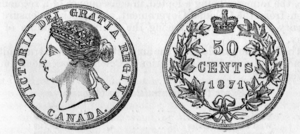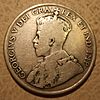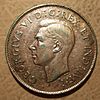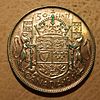Canadian fifty-cent coin facts for kids
| Canada | |
| Value | 0.50 Canadian dollar |
|---|---|
| Mass | 6.9 g |
| Diameter | 27.13 mm |
| Thickness | 1.95 mm |
| Edge | Milled |
| Composition | Nickel-plated steel 93.15% steel, 4.75% Cu, 2.1% Ni plating |
| Years of minting | 1870–present |
| Catalogue number | – |
| Obverse | |
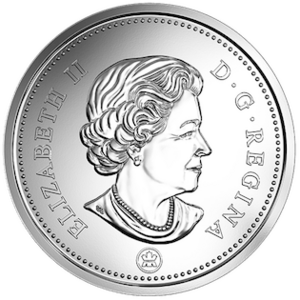 |
|
| Design | Elizabeth II, Queen of Canada |
| Designer | Susanna Blunt |
| Design date | 2003 |
| Reverse | |
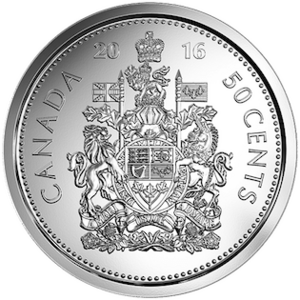 |
|
| Design | Canadian coat of arms |
| Designer | Thomas Shingles |
| Design date | 1959, updated 1997 |
The Canadian fifty-cent coin (also called pièce de 50 cents in French) is a Canadian coin. It is worth 50 cents. The back of the coin shows the coat of arms of Canada.
The first 50-cent coin made in Canada was struck on January 2, 1908. This happened at the opening of the Ottawa branch of the Royal Mint. The coin featured King Edward VII.
Contents
Why You Don't See Many 50-Cent Coins
Even though the 50-cent coin is still made, it's not produced in large amounts. On average, only about 150,000 are made each year. Since 2004, you can only get them directly from the mint.
It's very rare to find this coin in everyday shopping. Many Canadians mistakenly believe the coin is very rare and worth more than 50 cents. Because of this, people often save the coin if they get one. Sometimes, people even wonder if the coin is real because it's not often seen. It's a bit like the United States half-dollar coin. Most Vending machines also do not accept it.
The Royal Canadian Mint tried to make the coin more popular in 2002. They released a special edition to celebrate Elizabeth II's 50th year as Queen. But this effort didn't work well. After that, the mint stopped sending 50-cent coins to banks. Now, they only sell them in rolls or special coin sets. You can buy these directly from the mint for twice their face value. For example, a roll of 25 coins costs $25.
The mint's website describes the 2007 coat of arms 50-cent coin as "rarely seen yet full of tradition."
How the 50-Cent Coin is Made: A History
The materials used to make the 50-cent coin have changed over the years. Here's a look at its composition:
| Years | Weight | Diameter | Thickness | What it's Made Of |
|---|---|---|---|---|
| 1870–1919 | 11.62 g | 29.72 mm | n/a | 92.5% silver, 7.5% copper |
| 1920–1967 | 11.66 g | 29.72 mm | n/a | 80% silver, 20% copper |
| 1968–1999 | 8.10 g | 27.13 mm | 1.93 mm | 99.9% nickel |
| 2000–present | 6.90 g | 27.13 mm | 1.95 mm | 93.15% steel, 4.75% copper, 2.1% nickel plating |
The Super Rare 1921 Coin
In the early 1920s, people didn't need many 50-cent coins. Only 28,000 coins were made between 1921 and 1929. When more 50-cent coins were needed in 1929, the head of the Ottawa Mint made a big decision. He decided to melt down almost all the 1920 and 1921 coins. This was because he thought people might think they were fake if too many old coins suddenly appeared.
It's believed that only about 75 of the 1921 coins still exist today. Most of these came from special coin sets sold at the time. This coin is known as the "king of Canadian coins." It is very valuable because it is so rare. For example, a high-quality 1921 coin sold for over US$227,000 in 2010. The best-known example sold for US$400,000 in 2000. Today, it could be worth over US$1 million at an auction.
Most of these rare coins are found in "good" to "very good" condition. This means they were used a lot. Only a few are in "mint state," meaning they look brand new. A mint state example is very hard to find. It usually only comes up for sale about once every 10 years.
As of 2012, a 1921 coin in "very good" condition was worth about US$45,000. One in "gem mint" condition could be worth US$250,000 to US$350,000.
The Special 2000-P Coin
The 2000-P 50-cent coin is another very rare Canadian coin. Only about 276 of these coins were ever made. Each of these 276 coins was placed inside a clock. These clocks were given as gifts to employees of the mint. This makes the 2000-P 50-cent coin one of the rarest Canadian half-dollars ever produced.
Special Edition 50-Cent Coins
The Royal Canadian Mint has also released special versions of the 50-cent coin to celebrate important events.
| Image | Year | Theme | Artist | Mintage | Special notes |
|---|---|---|---|---|---|
 |
1967 | Canadian Centennial | Alex Colville | 4,211,392 | Features a howling wolf |
 |
2002 | Golden Jubilee of Elizabeth II | Cathy Bursey-Sabourin | 14,440,000 | This coin marked 50 years since Queen Elizabeth II became Queen. The front shows her special symbol "EIIR" instead of her usual name. |
| 2017 | Canada 150 | Ariana Cuvin | 875,000 | Features the Canada 150 logo, celebrating 150 years of Canada. |
First Coins Made
The mint also creates special "first strike" coins. These are some of the very first coins made in a new series.
| Year | Theme | Mintage | Issue price |
|---|---|---|---|
| 2005 | Coat of arms | 2,298 | $14.95 |
| 2006 | New mint mark | 5,000 | $29.95 |
 | John T. Biggers |
 | Thomas Blackshear |
 | Mark Bradford |
 | Beverly Buchanan |


